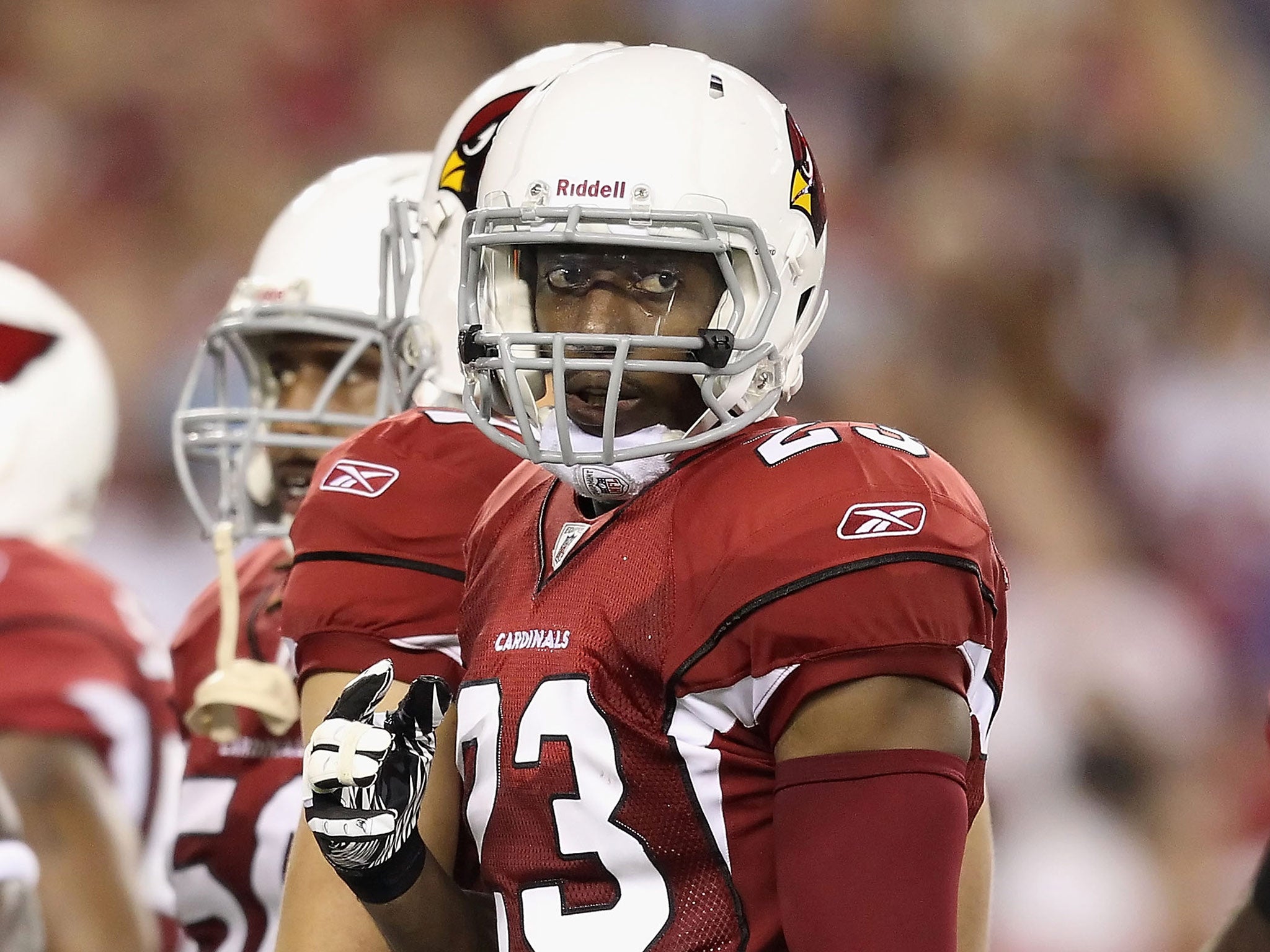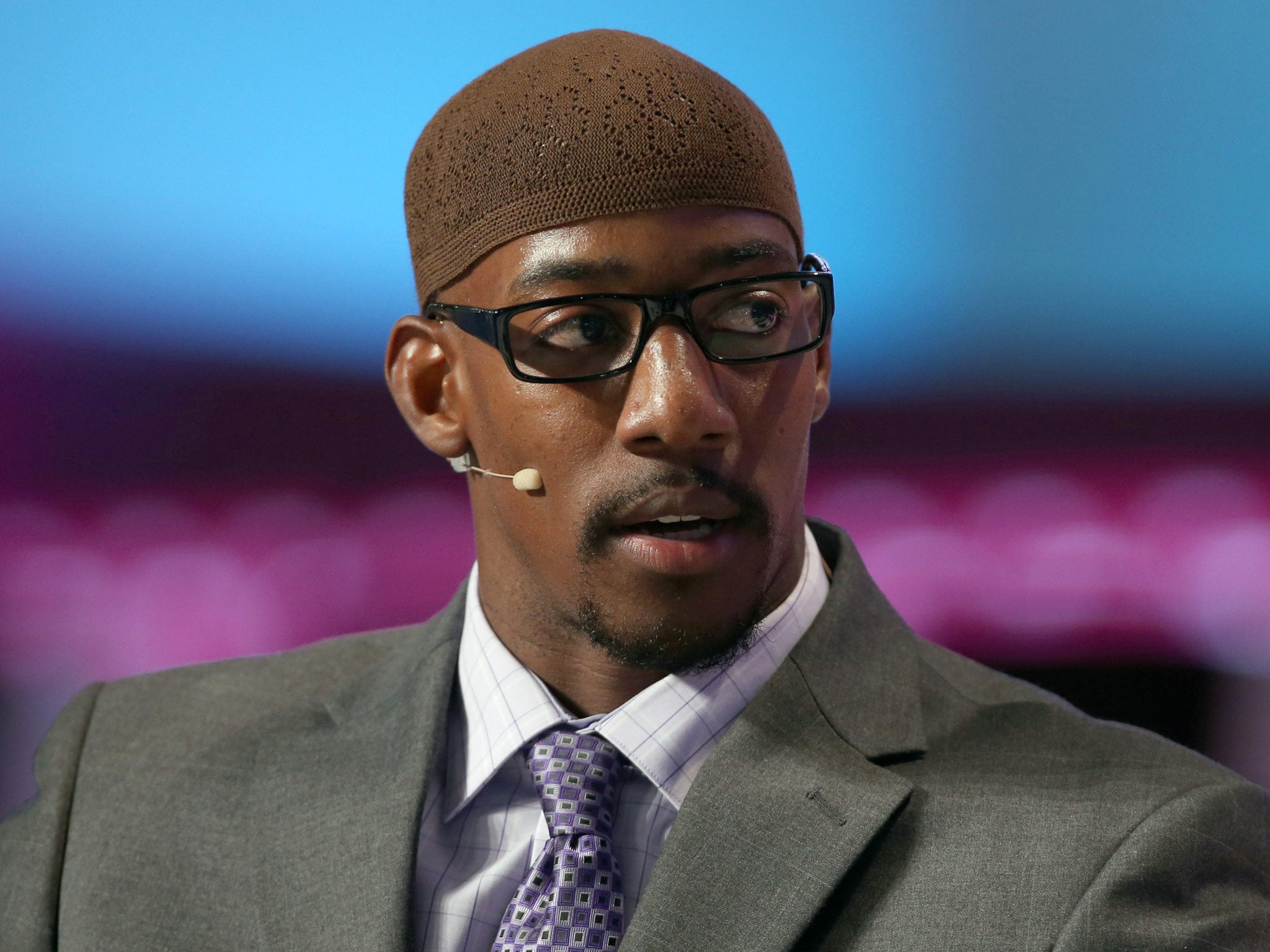Hamza Abdullah interview: Former NFL player claims 'we don't know' the facts of 9/11 terror attack
Former Denver Broncos and Arizona Cardinals safety player was among the most prominent Muslims in the NFL

Your support helps us to tell the story
From reproductive rights to climate change to Big Tech, The Independent is on the ground when the story is developing. Whether it's investigating the financials of Elon Musk's pro-Trump PAC or producing our latest documentary, 'The A Word', which shines a light on the American women fighting for reproductive rights, we know how important it is to parse out the facts from the messaging.
At such a critical moment in US history, we need reporters on the ground. Your donation allows us to keep sending journalists to speak to both sides of the story.
The Independent is trusted by Americans across the entire political spectrum. And unlike many other quality news outlets, we choose not to lock Americans out of our reporting and analysis with paywalls. We believe quality journalism should be available to everyone, paid for by those who can afford it.
Your support makes all the difference.Hamza Abdullah, the former Denver Broncos and Arizona Cardinals safety player, who retired last month, has made headlines recently for expletive-laden rants. In one, referring to how the NFL has handled player injuries, he called the organisation a “slave trade” and the League itself a “plantation”.
He later took some of the tweets down but I was not sure how he would react when I met him quite by chance in Doha last month. He was a speaker in Doha Goals Forum, a much hyped three day event, whose patron is the Emir of Qatar and which attracted high profile names ranging from politicians like Lord Mandelson and Ed Vaizey, the minister for Culture, Communications and Creative Industries to sporting legends: Boris Becker, Ilie Nastase, Nadia Comaneci, Katarina Witt, Michael Johnson, Kelly Holmes and Jonathan Edwards. Cherie Blair was listed as a speaker but did not turn up.
But, as we sit down to talk in a hotel, a two minute ride from where these dignitaries are meeting far from using any expletives Abdullah could not sound gentler. Indeed he calls me “sir” as he explains what it was like to be a rare Muslim in the NFL. Brought up by devout parents in Los Angeles he does not celebrate Christmas or Thanksgiving. “To be honest with you”, he says, “I’m kind of indifferent about it”.
The 30-year-old Abdullah is wearing a Kufi, the headgear for devout Muslim men, as he tells me how he and his brother Husain, who plays for Kansas City Chief, took the whole of 2012 off to go on the Haj, the obligatory pilgrimage to Mecca. The trip, he says, made him realise that contrary to propaganda the world’s Muslims do not hate Americans. “They look at you and they love you because you’re American”, he says.
9/11, and the events that followed, may suggest this is rather an optimistic interpretation but then Abdullah has told me that 9/11 “made me appreciate what I had and made me appreciate my country. I became a patriot, I became more of an American I would say.”
However when I probe how the NFL’s most prominent Muslim player feels about 9/11 it soon becomes clear not many of his countrymen would consider his views remotely American.
So when I ask his views about that atrocity he replies, “That’s not for me to say, you know, I will be judged on me, I can’t be judged on someone else, neither can they be judged on me.”
But surely he must think it was a horrific act?
“I think that every man does something in his life that we are afraid of, that we don’t want to come out to the light. So before I go on talking about someone else’s perceived ill intent I have to work on my perceived ill intent.”
But does he not think it was an evil act?
“I would say that I have to make sure, whatever I’m doing, I am being a good example for myself, for my family, for my children, for my society, for my religion. You know, what happened September 11th changed the course of history, and everyone will always be forever changed. And what we have to do is we have to make sure that we are identifying with each other and with ourselves, and we have to take care of our own home first before we go out and say ‘This person did this and that person did that’.”
Surely everyone knows that planes flew into the Twin Towers, killing innocent people?
“Well,” he responds, “We don’t even know, we speculate. What 100 per cent facts are there about what happened that day? We don’t know, right?”
Was he saying the plane didn’t…?
He cuts me short by replying, “Do we know the people that went into that or do we know what we were told?”
By this time not knowing quite what to ask I say, “So you think they might not have been Muslim?”
Abdullah answers, “No, no, I don’t know what they were, but if someone just says ‘Hey, that guy’s Muslim’, what if they said that person is a part of your neighbourhood? Well I don’t know, I have never seen that guy.”
So what happened on that day?
“I’m not a historian, I’m not a psychic, I’m not a soothsayer, all I am is Hamza Abdullah, I’m a Muslim, I am a father, I’m a husband, I’m a son, and all I can do is concern myself with what I can control.”

But in some ways his real jaw dropping answer comes when I ask whether he would not say Hitler was evil. “I would say that ‘My name is Hamza Abdullah and the person that I have to be accountable for is Hamza Abdullah’.” He than adds, “There is only one judge and that’s God. So as tough as something may seem, let’s say me and you together, we walk outside and we see someone shoot another man, what would we both say? ‘Whoa!’ Will you say ‘That is an evil act’, am I correct? But we don’t know the story behind that.”
Given his stance on 9/11, which is not uncommon among some fundamentalist Muslims, you may expect Abdullah to say his mission is to convert the whole world into Islam. But when I ask he emphatically makes it clear he has no such desire, “If God” he says, “wanted us all to be one colour, to be one race, to be one religion, guess what? We would all be one race, one colour, one religion, but we’re not.” And as for there being people with different religious beliefs he says, “That’s okay.”
And he emphasises that the non-profit organisation he has set up to help what he calls ”the transitioning athletes, the professional athletes that are done playing” will not be sectarian. Having decided to retire, because he says professional football “was wearing on me mentally and physically”, he can be quite eloquent about what prompted his decision to form the organisation.
“I’m passionate about helping my brothers and helping my sisters and helping my neighbours, and leaving this world in a better place, because in Islamic culture that’s what you are taught. It’s not about how big a house you have, it’s not about what kind of car you drive, it’s not about how much money that you have because you know why? When you meet your maker all that stuff is gone. The only thing that stays with you are what? Your good deeds. So your good deeds should be the number one thing that you cherish and that’s what I cherish.”
But will it be open to athletes of all faiths? “Oh, of course,” he says.
However his faith has made him so altruistic when I ask about his greatest sporting moment in a six year career which also saw him play for Tampa Bay Buccaneers and Cleveland Browns, he talks about his brother’s career.
“The number one moment was when my brother called me and said he had made the team to play in the National Football League. It was a feeling that I can’t describe. In Islam we are taught to want for your brother what you want for yourself. So I love the most about being in the NFL was seeing my brother attain the same achievements that I made and actually even go even further. He’s still paying, so I’m still gaining pleasure just from watching him.”
So it is no surprise to hear that not only does he feel Qatar should host the 2022 World Cup but that it can be played in the summer heat. “You can play whenever, that’s the thing about an athlete”.
And so impressed is he by what he has seen that he says, “I guarantee you they’re going to have something that people have never seen when it comes to the World Cup.” He has no doubts that the Qataris can fulfil their pledge to build stadiums to play in the head, “It’s not foreign to have a stadium that accommodates in the heat. I played in Arizona, Arizona would be 115, 116, 117 every week, but guess what we played in? 70 degree weather. It’s the same thing, it doesn’t matter what’s going on outside, you can control this element, these designs, these stadiums that they have now, that’s why they cost so much money, because you’re making a level playing field.”
Join our commenting forum
Join thought-provoking conversations, follow other Independent readers and see their replies
Comments